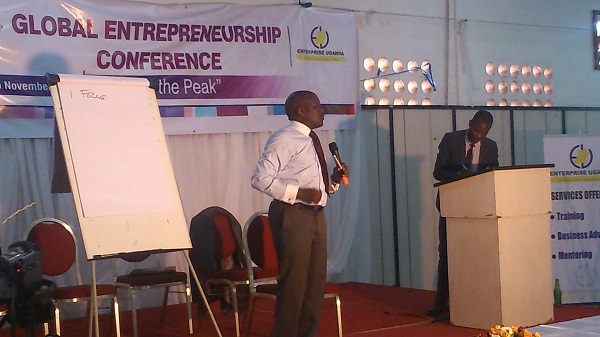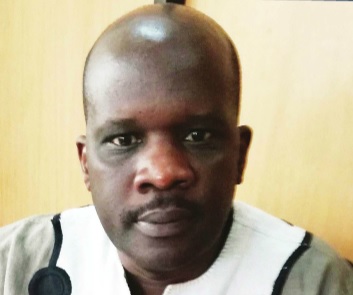
The middle income outlook will depend on what Uganda will do to wake up the population to be productive and be consistent at it. The target for middle income is 2020 but right now 68% of our population comprises peasants. We are hoping each one of them will be having $1,050 as income per annum by 2020.
INTERVIEW: Charles Ocici, the executive director of Enterprise Uganda, spoke to Flavia Nassaka about success in business and on Uganda’s chances of becoming a middle income country by 2020.
Ocici is one of the known names in Uganda when it comes to entrepreneurship. What is your management style a manager?
I allow people to find their space, explore their talents and maximize their potential. When a new employee comes in, I tell them to look across the corridor and see what the colleague is doing so that you can learn as much as possible and don’t wait to be supervised. That is contrary to the background where I come from. In the banking industry, you are always told what to do, reminded of the targets, and over monitored. In my view when you do that you are killing the seed of leadership that exists in every person. My role here is to simply keep giving them guidance and the opportunity. I don’t want to look at age, tribe or previous performance but I want to look at current attitude and output and how you are leveraging this to make yourself better.
Over the years Enterprise Uganda has been known for equipping entrepreneurs with skills. Any real examples of people who you have helped start out?
One thing we do at Enterprise Uganda is transform people’s attitude – that if you are running a business you should be able to compete and do this long term. We’ve trained many entrepreneurs. I will just pick a few that you may be quite familiar with but stories are numerous. Nina Interiors is one of such businesses. They were in existence before Enterprise Uganda but when we came in we gave them a facelift and steady progress through the years. Others we have trained include Ebenezer Laboratories owned by Kiyemba Kaggwa, Victorious Schools and Café Pap owned by Jolly Ngabirano who had no business at all. After our training, she started something that has succeeded. Barbara Ofwono Buyondo of Victorious Schools was a mere History and Divinity teacher but now employs more than 400 people. For all those we train we teach them how to change their attitude, which involves how you take actions, and the habits. Once you are able to run one enterprise well you are able to run many even if in different sectors.

How do you enroll these enterprises?
Businesses come in through a number of avenues and it depends on the resources we get. Some funders will say they want to focus on northern Uganda then that’s where we will take our trainings. Others will say they want micro businesses. We also work with the government. They tell us to focus on the jobless, peasants, youth and women. But, after such trainings initiated by donors or government we get referrals from people who want to learn more or want their colleagues to join. You know a satisfied client is more convincing than the institution wanting to do the training.
What is your assessment of the business environment in the country generally?
Business environment is a broad statement because you will be looking at issues to do with infrastructure, macroeconomic aspects such as inflation, forex, security, energy, education and health services etc. Looking at that range of items that make an environment conducive, there is still a lot to be done to improve our economic environment and there is no one time that we will have everything. There’s always room for an entrepreneur to start out no matter the kind of environment. Waiting for the macroeconomic environment to stabilise is completely utopian. Our focus shouldn’t be on the environment but on the occupants of the environment. For instance many roads are good now but when the trucks take goods to the country side, they come back to Kampala empty because nothing is being done there. They can’t carry anything from there. This tells us that the economy is in trouble.
In your view, is the government’s approach to empower the youth through the Youth Livelihood Programme the right one?
Youth livelihood as a concept is good but the way it has been delivered to the population is faulty. It has been perceived that to succeed in business all you need is capital forgetting that even people with money and connections in the market still get challenges. Capital is just one of the five pillars you need to succeed and if you don’t attend to the four your capital will go to waste. They are marketing, human resource management, customer care and how good and visionary the entrepreneur is. You don’t create an entrepreneur by throwing money at him or her.
The saying these days is that graduates should be job creators and not job seekers but would everyone be an entrepreneur?
Everybody has the potential to be an entrepreneur but they have just not gotten a chance to practice it. The reason people get comfortable and scared of going there is because it’s damn demanding and a lonely journey. Entrepreneurship has an element of leadership and God created everybody to be a leader.
Uganda is one of the best entrepreneur countries when it comes to starting out business but many live up to their fifth birthday. What are the issues pertaining to sustainability of business in Uganda?
Many people imagine that starting a business is all about getting an idea, registering the business and clients will come. This is far from it as you have to look at if one is competitive in terms of price, whether his human resource is right and his operations in terms of time and financing are right. There’s a way people are encouraged to get business loans but if you start a business with a loan just know you’ve started from the negative that’s why many never make it.
Is Uganda ready to transition into middle income status?
The target for middle income is 2020 but right now 68% of our population comprises peasants. We are hoping each one of them will be having $1,050 as income per annum by 2020. This is not likely to happen because people are surviving on a very low income base. We could easily have most roads tarmacked by 2020 but they will have nothing to carry. Recently, we launched an abattoir that requires 400 heads of cattle per day but the entire Uganda slaughters 1,000 cattle per day. This means that this abattoir will be idle because the cattle they want are for export and should be bullocks yet the ones we sell for slaughter are the old and sick. They don’t qualify to go to the abattoir and you talk of going to middle income by 2020? The middle income outlook will depend on what we will do to wake up the population to be productive and be consistent at it.
What is changing in Uganda’s business arena that entrepreneurs should be keen about?
Technology is changing and affecting a lot of things. For instance, it’s affecting the speed at which you communicate and discover new things as an entrepreneur. You are no longer competing with your next door neighbor but with the Chinese and the rest of the world. Modern entrepreneurs engage in a lot of research and training because the competition is also affecting the cost of finance. Should there be any extra cost coming with finance then you are finished because definitely the price of a good or services will also rise yet there are a number of producers of the same product taking advantage of the technology to market themselves far and wide. With technology, you should know your competitor is watching what you are doing every minute.
What are some common red flags that show a business isn’t on the right track?
When your suppliers start screaming and can’t supply you on credit anymore, just know you are in trouble and headed to seeking a loan. When you are perpetually on the loan and the volume of business is the same over a period of time it’s also a bad signal in addition to when you start seeing your best staff leaving without a strong reason. Also, when an entrepreneur fails to separate himself from the business they are creating a big gap that may not be filled when they are not there. Recently we have heard stories of those who need to be bailed out, most of them have not borrowed from one bank. It speaks volumes especially if their subsequent borrowings are worse than the past. If you redeem such people you are not solving any problem. Allow the fellows to go through the pains. Market forces are the best distributors of resources.
****
editor@independent.co.ug
 The Independent Uganda: You get the Truth we Pay the Price
The Independent Uganda: You get the Truth we Pay the Price





